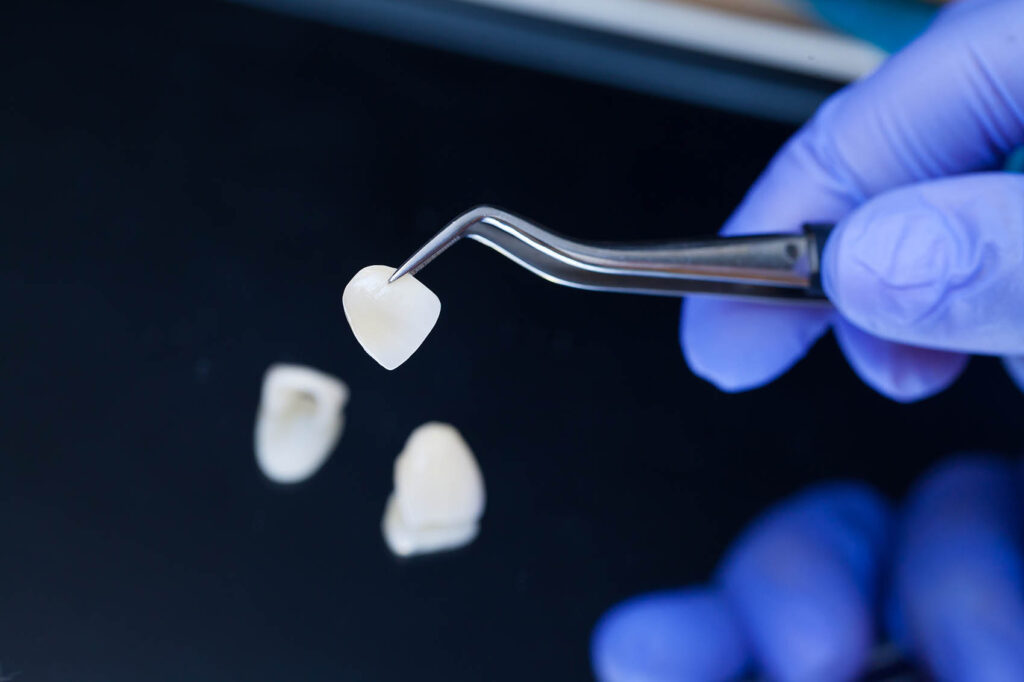Are you after a beautiful smile that you can show off with pride? Veneers are one cosmetic solution that can help you get there. Crafted to fit over the front surface of your teeth, they offer both functionality and that dream smile. As with any dental procedure, there are myths and misconceptions surrounding veneers and just how durable they are to provide a smile you can rely on for years to come. One question many people have is: Do veneers come off easily? The easy answer is no: once bonded to your teeth they offer a permanent solution to imperfections that can be enjoyed for years. We’ll explore the reasons behind potential detachment and offer guidance on what to do if you find yourself facing this unlikely situation.
Do veneers come off easily?
Dental veneers have transformed countless smiles, fitting over the front surface of existing teeth to cover any imperfections. But a question that frequently lingers in the minds of those considering them is: Do veneers come off easily? The answer is no.
When a qualified dentist undertakes the procedure, they begin by preparing the tooth’s surface, ensuring the veneer can bond securely. This involves a slight removal of the enamel to create a roughened surface for the adhesive. Following this, a strong dental cement is applied, and the veneer is set in place. Finally, ultraviolet light is used to harden the adhesive, ensuring the veneer is firmly attached to the tooth. If you’re wondering can veneers go over existing teeth, the answer is yes!
Given this in-depth application process, veneers are extremely durable. They are designed to withstand daily biting, chewing, and speaking. In fact, with proper care and maintenance, veneers can last anywhere from 10 to 15 years, and in some cases, even longer.
Of course, like any dental or cosmetic enhancement, veneers are not immune to potential issues. How long they last can be influenced by various factors, including oral habits, the quality of the adhesive used, and the expertise of the dentist performing the procedure. However, it’s important to note they definitely don’t “fall off easily”. Generally, veneers don’t just detach without a specific underlying cause.
Why do veneers fall off?
Veneers are known for their durability and while it’s relatively rare for veneers to detach spontaneously, when they do, there’s usually a reason.
Age of veneers
Over the years, the bond between the veneer and the tooth can naturally weaken. Most well-maintained veneers have a life expectancy of 10 to 15 years. As they approach the end of this period, the risk of detachment can increase.
Poor adhesive
If the bonding agent is of poor quality or if the dentist doesn’t apply it correctly, the veneer might not adhere as securely as it should. Other factors, such as exposure to extreme temperatures through hot drinks or ice, can also test the bond’s resilience.
Tooth decay
If a tooth starts to decay beneath the veneer, it can damage the surface to which the veneer is bonded. As the tooth deteriorates, the veneer may lose its grip, and potentially detach.
Teeth grinding
Bruxism, or teeth grinding, is a common nighttime habit for many. This unconscious act can put significant pressure on teeth, and over time can weaken the bond or even cause the veneer to crack. Dentists often recommend protective measures, such as wearing a night guard.
Lack of proper care
Neglecting oral hygiene can lead to gum disease or tooth decay, which can damage the veneer bond.
What Should You Do If Your Veneer Falls Off?
If your veneer does happen to fall off it can be alarming. While it’s a relatively rare occurrence, being prepared and knowing what steps to take can make all the difference.
- Stay calm: while it might be distressing, a detached veneer is not a dental emergency.
- Retrieve the veneer: if the veneer has come off entirely, carefully pick it up, handling it by its edges to avoid any further damage.
- Clean and store: rinse the veneer gently with water. Avoid using any chemicals or scrubbing it. Once cleaned, place it in a small container or envelope to keep it safe. If you can’t find the veneer, it’s possible you might have swallowed it. The veneer will naturally pass through your system, but if you experience discomfort, always seek medical attention.
- Contact your dentist: get in touch with your dentist and they’ll likely schedule an appointment to assess the cause of the detachment.
- Temporary measures: while waiting for your dental appointment, avoid foods that are too hot, cold, or chewy to prevent any discomfort or further damage to the exposed tooth.
- Prepare for the appointment: when you visit the dentist, remember to bring the veneer with you (if you have it). Your dentist will assess whether it can be reattached or if a replacement is necessary.
Treatment for Damaged Veneers (Steps to Resolve)
Whether it’s a chip, crack, or complete detachment, addressing a damaged veneer promptly is important. Here’s the steps involved:
- Dental assessment: the first step in addressing a damaged veneer is a thorough examination by a dentist. This allows them to determine the extent of the damage, the health of the underlying tooth, and the best course of action.
- Reattachment: if the veneer has detached but remains intact, and the underlying tooth is in good condition, the dentist might reattach it.
- Replacement: when the veneer is cracked, chipped, or the underlying tooth shows signs of decay or damage, a replacement is often the best option. The dentist will craft a new veneer from scratch.
- Temporary veneer: if there’s a waiting period before fitting a new veneer, the dentist might place a temporary veneer on the tooth.
- Addressing underlying issues: if tooth decay or gum disease is detected during the assessment, these issues will need to be addressed before proceeding with veneer replacement.
- Regular check-ups: following the treatment, regular dental check-ups are important. These allow the dentist to monitor the health of the veneer and the underlying tooth, ensuring any potential issues are identified and addressed early on.
Book a Veneers Consult
Taking the first step towards a radiant smile is easier than you might think. Whether you’re considering veneers for the first time or seeking advice on existing ones, a professional consultation with Skin + Dental Clinic is invaluable. Our skilled experts will share advice tailored to your unique dental situations, ensuring you make informed decisions about your oral health. Schedule your veneer consultation today! Want to learn more? Check out our dental veneers before and after photos to see the transformation.





